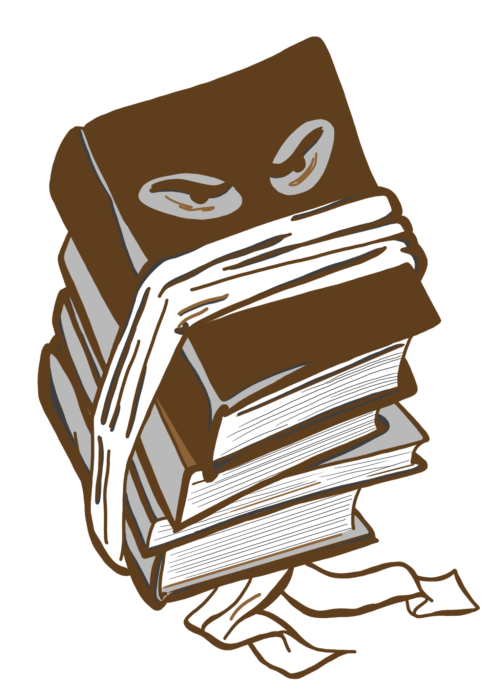Nolite te bastardes carborundorum. This mock-Latin aphorism, translated as “Don’t let the bastards grind you down,” plays a central role in Margaret Atwood’s feminist novel The Handmaid’s Tale, a commonly banned novel in several U.S. states including Virginia, Texas, Florida, and Oregon. As in many totalitarian societies, Atwood’s fictionalized state of Gilead forbids females from learning to read and write. This legal and social restriction enables its repressive government to more easily maintain control over them.
Unfortunately, elements of this fiction are still a reality in parts of the world. In Afghanistan, girls are forbidden from attending university and secondary school. In Guatemala, less than five percent of female students enroll in a four-year university. These are two examples of many. Denying females and minorities equal access to education allows those in power to use their resources to legitimate their own dominance.
America’s first banned book was Thomas Morton’s New English Canaan, a harsh critique of the Puritan settlers’ theocratic society, their treatment of Native Americans, and their rigid, moralistic social structure. Morton’s New English Canaan was outlawed by the Puritans, who sought to build a strict, religious society and saw Morton’s critiques as a threat to their authority.
In colonial America, books were often banned by local or religious councils who held significant power in their communities. After independence, censorship still occurred through federal or state laws.
Throughout history, powerful institutions like governments, religious organizations, and corporations have actively repressed books and authors they’ve found inflammatory, sacrilegious, or otherwise threatening to their authority. Authors often push against social and political norms, so it’s no surprise that societies push back. Whether it’s authoritarian regimes banning politically subversive works that criticize their governance, religious groups censoring texts that challenge dogma or promote secularism, or corporations suppressing narratives that expose unethical practices, there is a consistent pattern: literature that questions or undermines these dominant powers is frequently stifled.
More than 10,000 book bans were implemented in the 2023-2024 school year, more than double than in the 2022-2023 school year. Over time, the focus of censorship has shifted significantly, moving away from suppressing religious dissent, criticisms of totalitarian regimes, or content deemed politically subversive. In recent decades, particularly in the U.S., the nature of book banning has evolved to align with modern conservative issues, including books about racial injustice, gender expression, LGBTQIA+ relationships, and history that portrays the U.S. negatively.
A large number of books are getting banned that have nothing to do with social or political problems at all, like Matthew Cherry’s Hair Love or Justin Richardson’s And Tango Makes Three. These kinds of stories are centered around lead characters that are either not white, cisgender, heterosexual, or Christian. The book banning movement has, in some cases, become a more socially acceptable way for conservatives to express overt racism, homophobia, and other forms of bigotry under the guise of protecting children or preserving traditional values. It’s clear that the censorship isn’t always about controversial content, but rather about rejecting the very existence and visibility of marginalized groups.
The theme for the 2024 Banned Books Week, an annual event that highlights the value of free and open access to information, is “Freed Between the Lines,” an observance of the freedom we find in the pages of books and the need to defend that freedom from censorship. I believe “Freed Between the Lines” means that education should be free from oppression and encourage imaginative expression. Book bans are not just affecting authors, they’re also impacting teachers and all the students who deserve improved access to high-quality education.
Since writing has the power to expose the unexpected, uncomfortable, and unknown, censorship is used as a political weapon and an instrument of social control. Politicians are writing bills that ban words and restrict speech, and are threatening to arrest teachers, administrators, and artists solely because they speak up about important topics. Libraries in small towns are being closed. Librarians are being labeled pedophiles on social media, called out by local politicians, and reported to law enforcement officials for defending their right to provide and maintain a rich and diverse collection of books to students. They live in fear of being harassed and intimidated.
Those who censor are afraid of our commentary because we write to seek, reveal, and understand historical and personal tensions. We write to make sense of cultural anxieties and desires. We write to break prejudices within our society. Writing means freedom.
Ta-Nehisi Coates writes in his memoir, Between the World and Me, “I began to see discord, argument, chaos, perhaps even fear, as a kind of power. The gnawing discomfort, the chaos, and the intellectual vertigo were not in alarm. It was a beacon.”
We must continue to be unafraid of saying what society blacklists, bans, and censors, and we must remain hopeful that our discomfort will one day pave the way for open conversation. Our complex truths and experiences are what are going to change the world. Free expression isn’t just a feature of democracy; it’s a necessary prerequisite.
I find myself inclined to write about the unknown and the uncomfortable, and I am growing more interested in reading what society blacklists, bans, and censors. Do not conceal what you think because you are afraid. Seek to learn, listen to understand. Write to disrupt, read what discomforts.
Rania Jones ’27 (rjones@college.harvard.edu) has read The Handmaid’s Tale three times.

